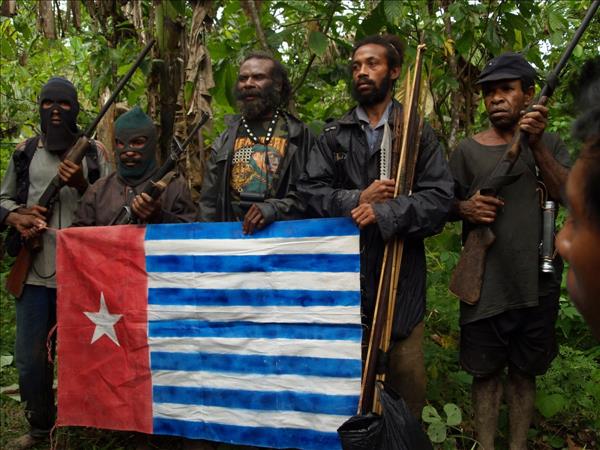(MENAFN- Asia Times) Papuan rebels have reportedly killed or captured up to 15 Indonesian soldiers in an ambush in the
mist-shrouded
central highlands
and close to where tribal gunmen have been holding a New Zealand pilot hostage for more than two months.
If confirmed, it is one of Indonesia's worst military setbacks, raising fears of a massive retaliation as security forces look for missing soldiers, most of whom are believed to be members of the elite Indonesian Special Forces (Kopassus).
The ambush took place in Mugi, on the Nduga-Lany Jaya district border, scene of army operations aimed at freeing pilot Phillip Mehrtens, kidnapped from an airstrip 100 kilometers to the south on February 7.
Indonesian National Armed Forces (TNI) spokesman Rear Admiral Julius Widjojono told a press conference in Jakarta that the shootout may force TNI chief Admiral Yudo Magono to re-evaluate his approach, which has so far tried to avoid an armed confrontation.
The 36-man patrol unit mostly comprised troops from the Jakarta-based 321st
Army Strategic Reserve (Kostrad) battalion, a well-trained regular army force dispatched to Papua not long after Mehrtens was abducted.
Widjojono sought to play down initial military reports of six dead, saying the only confirmed victim was a Kostrad soldier who fell into a 15-meter-deep ravine after being shot during an early-morning engagement on Saturday.
But Papua media outlets say the other casualties were inflicted later in the afternoon when an estimated 60 rebels from the West Papua Liberation Army (TPNPB) carried out a surprise attack on troops trying to recover the body.
TPNPB spokesman Sebby Sambom claimed 13 soldiers died in the engagement, but little is known about the fate of the nine servicemen reportedly seized when they apparently ran out of ammunition and lost communications.
One media report said the rebels later radioed the military task force and told the commander:“Hey, you want your guys. Come and get them.”
The circumstances of what happened are likely to become clearer if the rebels release photographs of the captives or the ambush scene on social media, which they often use for propaganda.
It is unusual for the TPNPB to attack in such numbers, which suggests it was carefully planned by rebel leader Egianus Kogoya, 24, a self-styled brigadier-general and architect of the brutal killing of 19 bridge workers on the Trans-Papua Highway in December 2018.
Kogoya's father was a life-long independence fighter who was killed in a Mapenduma, Nduga, hostage crisis in 1996. His younger brother, Undinus, leads a separate rebel band that was last reported operating in Puncak.
It is presumably diplomatic pressure – and the deaths of two of 11 abducted botanists in the Mapanduma rescue attempt – that has persuaded the government and the armed forces to act cautiously up to now.
TPNB is the military wing of the long-established Free Papua Movement (OPM), which has been fighting for independence since Papua became part of Indonesia in a controversial United Nations-sponsored Act of Free Choice in 1969.
The government initially labeled the TPNB a terrorist organization, but in more recent years it has come to refer to it collectively as the Armed Criminal Group (KKB), arguing that its political goals mask outright criminality and extortion.
The rebels were initially armed with only bows and arrows and machetes, but in more recent years they have been carrying an increasing number of automatic weapons, many of them seized from police and army outposts.
Previously, the TPNB had demanded the withdrawal of Indonesian troops and independence for Papua in exchange for Mehrtens' release, but it has since said it is open to dialogue, which may mean the payment of a ransom.
New Zealand diplomats in Timika, a staging post on Papua's south coast, had to abandon efforts to air drop medication to the pilot, who suffers from asthma. Instead, the inhalers were sent to intermediaries, but it is not clear whether they were delivered safely.
Flights disrupted
Mehrtens is an employee of Susi Air, a small airline owned by former fisheries minister Susi Pudjiastuti, which had its beginnings flying fresh seafood from a processing plant on the south coast of Java to Jakarta in the early 2000s.
Pudjiastuti says she has had to halt 40% of overall flight operations in Papua and as many as 70% of routes to remote airstrips that are poorly guarded and provide the only link to the outside world in the rugged, largely roadless interior.
The New Zealander's plane was burned by the rebels, who later warned Susi Air and other airlines servicing Papua to stop employing foreign pilots, many of whom are seeking to build up their skills and flying hours in some of the world's most demanding terrain.
The fallout from Mehrtens' kidnapping has also raised concerns about the safety of foreign missionaries across the western highlands, particularly in Nduga and the neighboring districts of Puncak and Intan Jaya.
Long-simmering conflicts between Catholics and Protestant religious groups have a become another complicating factor. This month, armed rebels
entered a market in Intan Jaya and told the people there they would have to convert to Catholicism.
Also this month, two helicopters were dispatched to a village in Puncak to carry out the emergency evacuation of two missionary families, comprising 11 adults and children, who had been warned that rebel groups were on their way to kidnap them.
It is understood there are about 25 missionary couples remaining in the more remote parts of the central highlands, down from an estimated 300 in earlier years when the government made efforts to prevent foreigners from proselytizing.
Like this:Like Loading...




















Comments
No comment